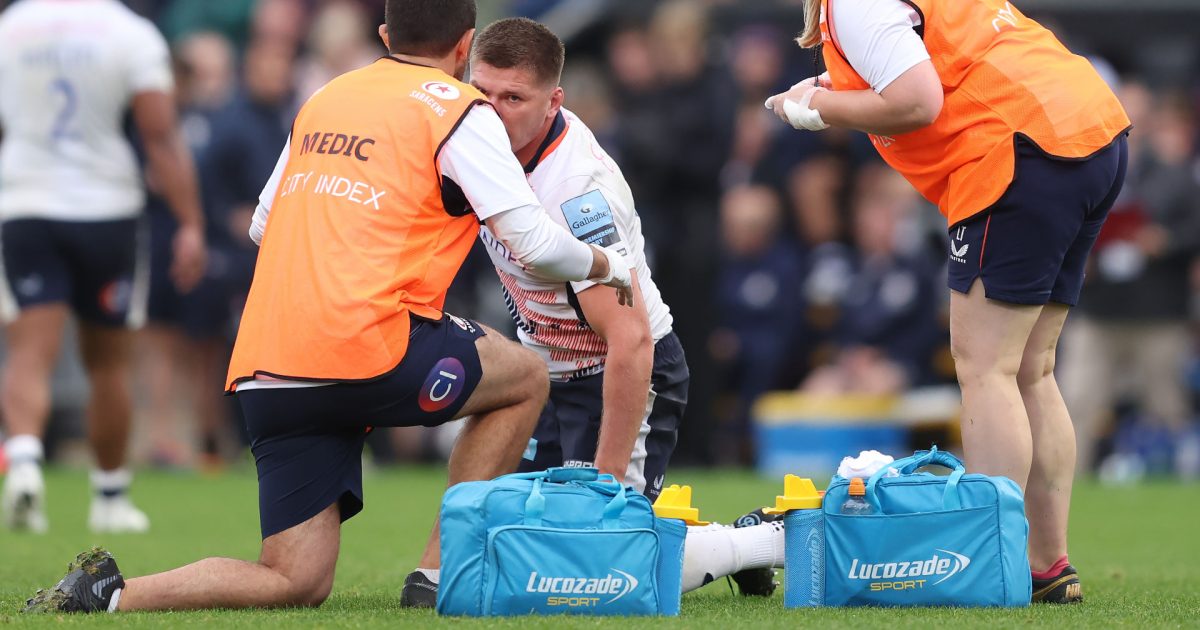England counts cost as injuries mar Saracens win over Exeter

Alex Goode fired leaders Saracens to a sixth successive Gallagher Premiership victory as his penalty with the game’s final kick edged out Exeter 22-20 at Sandy Park.
But England boss Eddie Jones suffered a double fitness scare as Saracens and England fly-half Owen Farrell went off midway through the second period after taking a blow to his head, while a knee injury forced Exeter hooker Luke Cowan-Dickie’s half-time exit.
Chiefs centre Henry Slade looked to have responded to his omission from England’s Autumn Nations Series squad by kicking a match-winning penalty four minutes from time.
But Goode, on as a replacement for Farrell and making a record-equalling 338th Saracens first team appearance, came up trumps with the clock in the red.
Farrell and his England colleague Mako Vunipola were yellow carded, with Vunipola – playing his first game after a three-match ban – being sin-binned for collapsing an Exeter driving maul and conceding a penalty try in the process.
But Saracens largely kept their composure on a testing afternoon as flanker Theo McFarland scored a first-half try, while Farrell converted and kicked two penalties, with full-back Elliot Daly adding two long-range strikes and Goode a late clincher.
It was an assured display from the visitors, despite occasional lapses in discipline, underlining their title credentials in pursuit of Premiership silverware they last captured three years ago.
Exeter had their moments, but not enough of them, to disrupt Saracens’ well-oiled machine, ensuring a tense finish after number eight Jacques Vermeuelen’s 71st-minute try that centre Slade converted, following an early penalty and the penalty try.
Saracens were their own worst enemy in the opening stages, seeing a penalty reversed for foul play, then losing Farrell to a sixth-minute yellow card.
The Saracens skipper illegally impeded Chiefs wing Jack Nowell, and referee Tom Foley, whose patience was already running thin, sent Farrell packing.
Exeter could not make their temporary one-man advantage count, though, then Chiefs’ Scotland international full-back Stuart Hogg departed for a head injury assessment, with Joe Simmonds replacing him.
Slade kicked Exeter ahead through a 48-metre penalty following a scoreless opening quarter, but Saracens responded in clinical fashion.
Daly and wing Max Malins combined impressively to ask questions of Exeter’s defence, and before the Chiefs could regroup, McFarland surged through a gap to score from his team’s first attack, with Farrell converting.
Hogg then rejoined the action and he proved comfortably Exeter’s most dangerous attacker as defences dominated.
And Exeter regained the lead just before half-time after referee Foley handed out another yellow card, this time to Vunipola.
It then got worse for the visitors as Vunipola was not only sin-binned for pulling down an ominous driving maul, his actions were also deemed worthy of conceding a penalty try.
But Exeter’s narrow advantage proved short-lived, with Daly kicking a 40-metre penalty into the wind to make it 10-10 at half-time.
Cowan-Dickie did not reappear for the second period, being replaced by Jack Yeandle, and Saracens went back in front through a Farrell penalty after Chiefs fly-half Harvey Skinner was yellow-carded for a technical infringement.
There was no let-up in the intensity and both coaches began making changes ahead of the final quarter, although Hogg’s 54th-minute exit saw him shake his head repeatedly in disapproval as he left the pitch.
Farrell extended Saracens’ advantage with a 30-metre penalty, but he exited the action on 61 minutes after taking an accidental knee to the head, with Goode replacing him.
Super-sub Alex Goode sends it at Sandy Park #EXEvSAR | Credit: @btsportrugby pic.twitter.com/x9iPVZKyvk
— RugbyPass (@RugbyPass) October 22, 2022
Farrell’s penalty double had given Saracens a degree of breathing space, then Daly added a penalty from five metres inside his own half, only for Exeter to respond when Vermeulen touched down following Skinner’s half-break.
Goode, though, had the final say after Slade’s three-pointer as Saracens claimed a first Premiership away win against Exeter since 2016.















